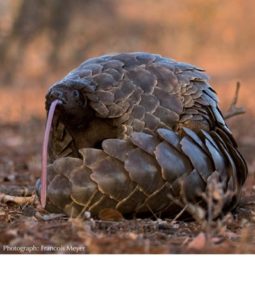One of nature’s most intriguing species is the pangolin. It is the size of a small dog, covered in scales with a tail like a dinosaur, powerful claws, a long snout, no teeth and a very long serpentine tongue. Pangolins eat ants, termites, and larvae that they pick up using their sticky tongues. To protect themselves from predators, they will curl into a tight ball and will use their sharp-scaled tails to defend themselves. Worldwide, there are eight species, four in Africa and four in Asia with some species living on the ground and others occurring in trees. Sadly, they are regarded as the most trafficked wild mammals in the world, as they are considered culturally significant in Africa and Asia due to their unique appearance and habits. In 2017, a ban on international commercial trade of all eight species took effect. However, despite this, nearly 70 countries and territories have been involved in the illegal pangolin trade in the last decade. A recent news article details how an undercover sting outwitted pangolin traffickers (https://www.bbc.co.uk/news/world-africa-66375281).
 To learn more about these fascinating creatures check out some books that Dr Desiré Dalton (Lecturer, Teesside University) has contributed to (https://shop.elsevier.com/books/pangolins/challender/978-0-12-815507-3 and http://opus.sanbi.org/jspui/handle/20.500.12143/8591) or have a look at her research (https://pubmed.ncbi.nlm.nih.gov/27510566/ and https://pubmed.ncbi.nlm.nih.gov/28177847/).
To learn more about these fascinating creatures check out some books that Dr Desiré Dalton (Lecturer, Teesside University) has contributed to (https://shop.elsevier.com/books/pangolins/challender/978-0-12-815507-3 and http://opus.sanbi.org/jspui/handle/20.500.12143/8591) or have a look at her research (https://pubmed.ncbi.nlm.nih.gov/27510566/ and https://pubmed.ncbi.nlm.nih.gov/28177847/).


